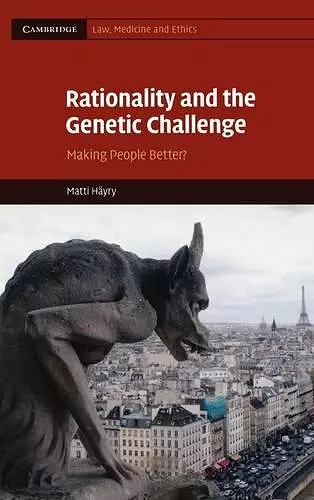Rationality and the Genetic Challenge
Making People Better?
Format:Hardback
Publisher:Cambridge University Press
Published:11th Feb '10
Currently unavailable, and unfortunately no date known when it will be back
This hardback is available in another edition too:
- Paperback£39.99(9780521757133)

Matti Häyry asks if we should make people healthier, smarter, and longer-lived if genetic and medical advances allow it.
Should we make people healthier, smarter and longer-lived if medical advances enable us to do so? In the context of developments such as genetic testing, stem cell research and gene therapy, Matti Häyry explores topics including parental responsibility, the use of people as means and the dignity of life.Should we make people healthier, smarter, and longer-lived if genetic and medical advances enable us to do so? Matti Häyry asks this question in the context of genetic testing and selection, cloning and stem cell research, gene therapies and enhancements. The ethical questions explored include parental responsibility, the use of people as means, the role of hope and fear in risk assessment, and the dignity and meaning of life. Taking as a starting point the arguments presented by Jonathan Glover, John Harris, Ronald M. Green, Jürgen Habermas, Michael J. Sandel, and Leon R. Kass, who defend a particular normative view as the only rational or moral answer, Matti Häyry argues that many coherent rationalities and moralities exist in the field, and that to claim otherwise is mistaken.
'Häyry gives us a masterful topography and analysis of the philosophical and ethical questions raised by attempts to 'make better future people and to make existing people better.' Anyone who is interested in the challenges posed by genetics (and who wouldn't be?) - from educated lay persons to professionals in the field - will find this a must read by one of today's most outstanding philosophers.' Thomasine Kushner, University of California, Berkeley
'Hayry's book will be incredibly useful for those who are baffled by the complex, contentious, and at times confused discussions of genetic issues; for those deeply immersed in these discussions, it provides a model for a respectful, reflective, yet critical discussion, which is increasingly hard to find in the field of bioethics. The underlying theme of the work presents a remarkable message for bioethicists and the public at large, namely that the rancor and contention that is a hallmark of so much debate would be better replaced with the kind of Colleridgean 'disinterested interest' to allow the issues to be more rationally assessed. In this regard, the book might well be read not only for the ethical issues in the new genetics, but for the underlying methodological approach. Since either the treatment of the genetic challenge or the methodological approach to complex bioethical issues is worth the price of this volume, this book should be read with alacrity.' George J. Agich, Bowling Green State University
ISBN: 9780521763363
Dimensions: 229mm x 152mm x 21mm
Weight: 590g
286 pages